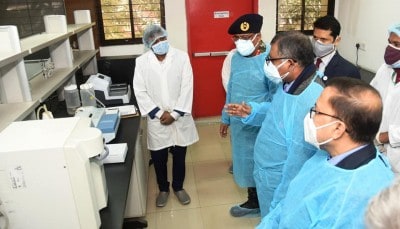By Sumi Khan
Dhaka, Feb 7 : The Oxford-AstraZeneca Covid-19 vaccine from the Serum Institute of India (SII) is being rolled out across Bangladesh on Sunday amid lukewarm interest from the people to receive the shots against the virus.
Two million vaccine doses arrived in the country on time from India as a gift. The vials were sent across the country as planned, and the vaccinators and volunteers have been trained.
The nationwide immunisation drive against the coronavirus in 1,015 centres started on Sunday after revising its vaccination plan to administer 3.5 million doses in the first month instead of 6 million.
The programme will include as many as 2,402 teams of health workers. Each team will comprise four members, two health workers and two volunteers.
“Alhough the Bangladesh government is set to launch the mass vaccination programme across the country on Sunday, due to country-wide Anti-India propaganda public apathy to get registered for it looks to be a major challenge to make the drive a success,” ABM Abdullah physician, academic, professor emeritus of Dhaka University and the personal physician of Prime Minister Sheikh Hasina, said on Saturday night.
Under the circumstances, the government has decided to vaccinate 3.5 million people instead of over 6 million in the first month of the drive, said Zahid Maleque, the Health Minister of Bangladesh.
The Bangladesh government has purchased 30 million doses of the vaccine. It has already received a total of seven million doses of the vaccine.
Bangladesh is expected to receive 12.5 million doses of the Oxford-AstraZeneca vaccine in the first half of 2021 under COVAX, the WHO-backed global scheme for distributing the coronavirus vaccines.
The two-day piloting was successfully carried out on January 28, but none of the 567 volunteers who took the first shot of the two-dose Oxford-AstraZeneca vaccine has complained of any major side effect.
But the response from people eligible for inoculation in the first phase has been underwhelming.
Employees of the Health Ministry will be administered with the Covid-19 vaccine on Sunday morning, said Abul Bashar Mohammad Khurshid Alam, director general of the Directorate General of Health Services (DGHS).
“Political leaders and people’s representatives will take part in vaccination centeres in different hospitals of the capital and the country to motivate the people for the vaccination,” he added.
Mohammad Enamur Rahim, physician and State Minister for Relief and Disaster Management and Farhad Hossain, state minister for Public Administration will administer the corona vaccine at Gastroliver Hospital in the capital and Minister for Home Affairs Asaduzzaman Khan at Suhrawardy Medical College Hospital in Dhaka.
While the government’s target was to vaccinate 260,000 people each day, only 3,28,000 people got registered online in eleven days as of Saturday afternoon.
The doses will be administered in five stages under three phases. Priorities will be given to health workers and others on the frontline.
Health workers from each group can vaccinate a maximum of 150 people. Hence it will be possible to vaccinate 3,29,400 people on the first day.
According to the national Covid vaccine distribution and preparation plan, the Bangladesh government will inoculate 80 per cent of the country’s population, or around 138.24 million people, Health Minister Maleque said.
Each person will be given two doses of the vaccine, he added.
“Anyone will be registered and vaccinated. If there is a delay in registration, the vaccines will be given first and the data will be recorded later. We will not send anyone back.”
Zahid urged all to get vaccinated saying that preparations for the inoculation drive are almost complete. “All those who have been vaccinated so far are healthy.”
At least 2,400 teams will work in the country. Each team has the capacity to vaccinate 150 people.
At the district and upazila level, vaccination will be administered from 8 am to 2.30 p.m.
Health representatives are conducting campaigns, including using loudspeakers, publishing contents in various media outlets to encourage people in rural areas across the country to take the shot.
A participant has to bring his National Identity Card for registration.
Many people do not have smartphones and may not be able to register and or this reason, chairmen, mayors and MPs will bring the people to the centres and get them registered and vaccinate.
Disclaimer: This story is auto-generated from IANS service.

